Why Corallo and Pollack invited Dionysus to throw The Never Ending Party
New Comixology Originals series The Never Ending Party is as much about ecstasy as it is about grief and queer liberation
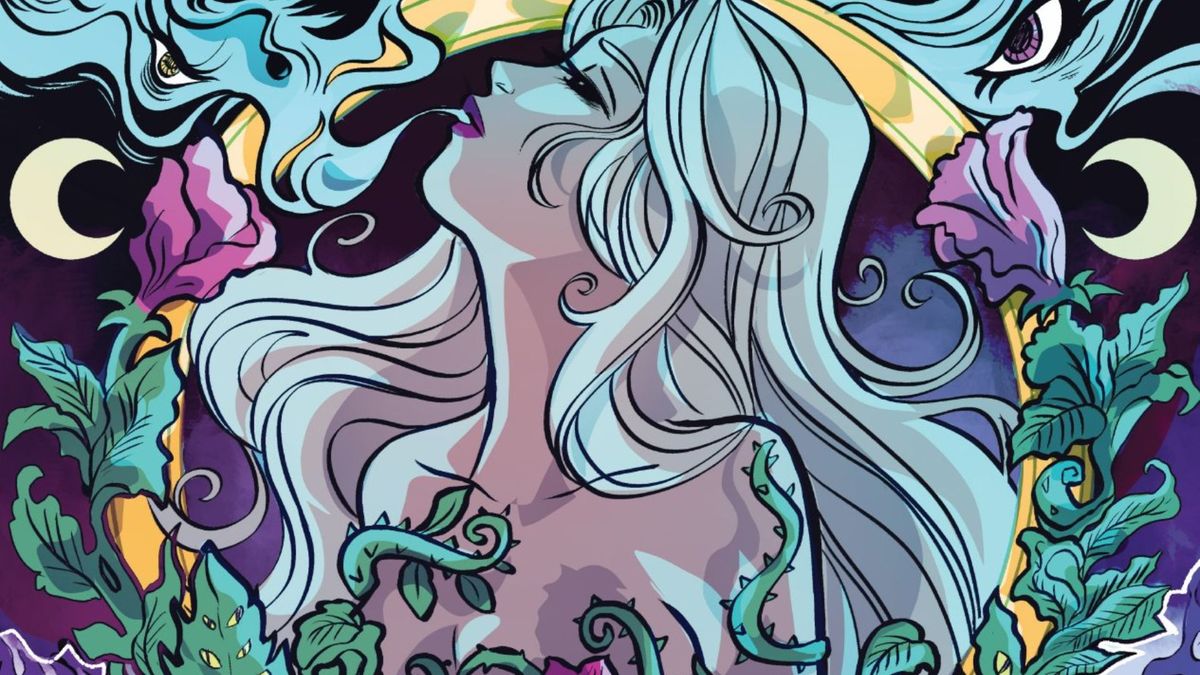
At what point does endless pleasure cross the line into endless pain? When the Greek god Dionysus comes to town, he brings the party with him, but that may not be for the best – as discovered by the characters in the new Comixology Originals series, The Never Ending Party.
Co-written by Joe Corallo and Rachel Pollack, with art by Eva Cabrera, colors by Cons Oroza and Eva Cabrera, letters by Zaak Samm and Micah Meyers, and edited by Noah Sharma, The Never Ending Party is a five-issue series following a group of LGBTQIA+ partiers who want to have the best time ever, and use a magical ritual to summon Dionysus to make that happen. The series bounces between 1995, when the ritual is performed, and the present day, when those who survived it have mostly moved on and established lives for themselves.
But when the past returns – literally – it forces the characters to examine who they were, who they've become, and what it means to seek ecstasy and instead be met with excruciating loss.
Ahead of the debut of The Never Ending Party on June 7, Newsarama spoke with Corallo and Pollack about the series, including their inspiration and what readers can expect from the supernatural, magical, queer story.
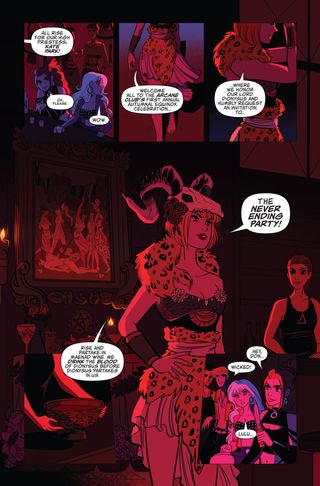
Samantha Puc for Newsarama: Rachel, Joe, what inspired the story in The Never Ending Party?
Joe Corallo: I had connected with Rachel some years ago after reading her run on Doom Patrol, and we started an email correspondence. Then I edited the Mine! Anthology to benefit Planned Parenthood, and Rachel did a story in that. She was doing little short stories for anthologies, things like that. I was kicking around some ideas and I wondered, 'What would be a good idea that I could co-write with Rachel?' I was delving back into queerness, my first memories of it growing up, and it was being home from school and Geraldo Rivera or something would come on. Once a year or so, he would have the "club kids" on – so my introduction to people like Ru Paul was Geraldo.
Rachel Pollack: God, what an introduction.
Comic deals, prizes and latest news
Get the best comic news, insights, opinions, analysis and more!
Corallo: Yeah! The insanity of it all. I've been interested in club kid culture, but it all came together because that was all around in the early '90s – when Vertigo was happening, when Rachel was doing Doom Patrol. So I thought, 'What if we did something that started there, but it connected to the present?' That all fell into place and I reached out to Rachel with the beginnings of an idea, and then we started to flush it out.
Pollack: One of the things that excited me about it was that Joe had this idea of these people from that time, who were young and excited and loved going to all the parties, and who decided to do something so the party would never end – who decided to do some magic ritual, thereby summoning some kind of demonic, H.P. Lovecraft God type of character. I'm a lover of Greek mythology, and I thought, 'Well there actually was a Greek God of never-ending parties, and that was Dionysus.' I came up with the idea that maybe they should invoke Dionysus, who has been waiting for this for a long time, for a chance to free the never-ending party on the world and get way, way out of hand. From there, I got to look at other Greek mythology figures, like Orpheus, and make kind of a comic figure. That was just a lot of fun. And then we just played around with where it would go, what would happen, how it would come to an end...
One of the things Joe was interested in was that the period of Geraldo Rivera was the first time trans characters were in the public eye. They were usually outrageous queens, way over the top people everyone could almost make fun of. Then I thought, 'Suppose one of our characters goes off into another world with Dionysus in 1995 and then comes back?' How would her ex-girlfriend try to tell her what's going on with the trans movement now? How bizarre it would seem to her, that people would accept trans people, and there are all these rules about what you're supposed to say and not say? She gets it all wrong, because she's not from now, so that was a sort of satirical look at the stuff that's going on now. But the idea of a worldwide, destructive party was great.
Corallo: There are so many amazing lines that we got to work on, or that Rachel would come up with. In explaining how far we've come, it was like, 'There are trans people who are running for governor now – as Republicans! That's how far we've come!'
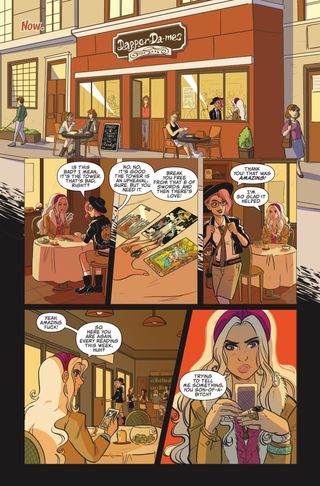
Nrama: What are you most excited about with this series?
Corallo: It's always tough because you're so close to it, and you want people to see everything. But I think especially once we get to that third issue, by that halfway point where we see a lot of devastation and things get really out of control, there are some good twists and stuff that happen. In a broader sense, we don't hold back much in the dialogue and the things being discussed and the actions people are taking.
It's been great seeing the growth of queer works, and it's been great that there are a lot more queer works out there for younger audiences. That is all-important, and I am not trying to say this in a way to diminish that. But I'm of a certain age, and Rachel is of a certain age, where I'd like to see more of that feeling of the gritty, grimy, underground queer comics. I don't think we hit that level [in The Never Ending Party], but there is a rawness to a lot of what happens to these characters. It's done in an unapologetic way and it's the kind of thing where you want to make the comic you want to read. I'm excited for people to see that.
Pollack: As the whole queer culture becomes more acceptable and more mainstream, what happens to the people who are the radicals? Not just politically, but in their whole way of embracing queerness as this wild, wild lifestyle. Where do they fit in? When the 1995 people suddenly meet the 2020 people, what will be the differences between them?
The theme of a god or spirit unleashing absolute freedom of ecstasy, and it being so destructive, was a theme of a book of mine called Temporary Agency back in the '90s. It was fun to come back to that theme and say how, 'We completely embrace freedom, and yet if it's going to be divorced of anything else, it can end up being terribly destructive.' If all there is, is license to go wild, and you're being encouraged to do so by some divine being... I thought that was more interesting than a demon who wants to destroy things. Dionysus just wants to release ecstasy and have it be non-stop.
Nrama: Tarot is obviously a big component of the storytelling here. Did you do readings as you outlined and wrote, or did you just pull cards from the deck that knew would work as plot devices?
Pollack: It was Joe's idea to have the main character as a tarot reader. She's one of the characters who was still here after 1995, and she has kind of a respectable life. She also is a professional tarot reader at a club. I chose the cards that would come to be meaningful in certain situations. So the Tower is a big one, which is about destruction and lightning and everything chaotic. People being thrown out of buildings. That had to be there. Tarot was meant to be a way to move the plot, and it kind of gives hints about how the characters will deal with it. What approach they can take that will actually get them somewhere.
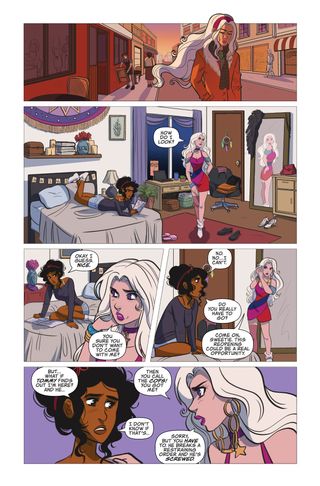
Nrama: What other magical elements can readers expect to see?
Corallo: There's conflict and gore and romance. There's a séance.
Pollack: They bring someone back from the dead, too. There are also ways the characters are doing magical things – Orpheus is there and he's trying to bring his wife back from the dead. I had a lot of fun writing Orpheus as kind of a jerk. He's so revered by Greek mythology, and I had him be an egoistic artist.
Otherwise, statues come alive and people transform... There's a lot of transformational stuff at the magical level. Chaos and a never-ending party means... you drink or get high or whatever, and you become someone else. Now that's literal.
Nrama: What do you hope readers take away?
Pollack: I hope they take away having a lot of fun because we had a lot of fun writing it. Hopefully, they get that from it. I wouldn't want them to take away any kind of warning about having too many parties, because that would be ridiculous and that's not what it's about. There is danger of only seeing one aspect of life, which is ecstasy. It's not that ecstasy is bad – we're not Puritan at all – but if that's all you can be aware of, something's going to happen that you don't like.
Corallo: Life is more fun when we're having fun with other people. I hope that people are able to read something like this, internalize some things, think about some things, reflect a bit about who they are, who they present themselves as, being your authentic self... There's a lot of that in [The Never Ending Party].
Pollack: That's interesting, because part of the tension between the woman who comes back from 1995 and her lover, who's been here all this time and seen all the changes that have happened, is that the woman who comes back knows it's great and there's all this trans liberation... but it's not her. It's not her true self. She'd be faking it for this modern way of seeing things. And that's something that she grapples with.
There are also issues of abuse in there. We have a character who, through Dionysus, finds her power to stand up to her abuser. The whole idea of a party and ecstasy can empower someone, but she also realizes she doesn't have to take anything from this guy.
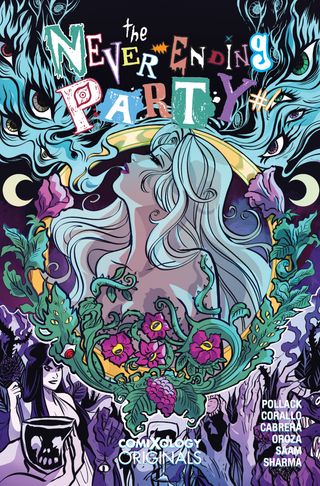
Nrama: Is there anything you'd like to add?
Pollack: I'm sure there are kids interested in Greek mythology, and most people don't realize the stories we read as kids about the Greek gods were not the real stories. Someone might come away from The Never Ending Story having heard of Orpheus and Dionysus, but then have to take another look. Leave space for some more radical views of these characters and how they can affect us now. As we grapple with all these issues in our lives, it's good to have models from mythology, but the models we get are these very sanitized models. Greek mythology for kids. Everyone's nice. I would like to inspire people to look a little bit deeper than what they might have learned in school.
Corallo: That could even extend to examining your own past because characters like Mindy have flashbacks throughout the story. It's sort of about examining where you came from, who you are, how that person got to be you, and the decisions you made along the way. I think a lot of us, at some point or another, may to some extent be guilty of sterilizing our own past. That's important to examine. I hope it gets people thinking about those things as well.
Pollack: There are a lot of movies that have come out wherein somebody goes back in time to her younger self, but there's never been one in which the younger self comes into now, or where the younger self's best friend comes into now. The person who's lived here the entire time is reminded of what they were, too. Now they've made compromises and they've got jobs and all the other stuff people do when they get older and stop being wild kids.
If it was you and your best pal or your lover from 20 years ago showed up exactly as they were 20 years ago, this would be something for you to confront about yourself. 'How did I become so different? How did I become who I am now? Did I lose something? Am I better now? Do I like myself now? Do I wish I was like I was back then?' Rather than someone going back to relive her past, this is her past coming into her present, and that's a real shock.
The Never Ending Party debuts June 7 on Comixology.
The best supernatural superheroes of all time might have a different way of approaching the sudden appearance of a pleasure-obsessed Greek god.

Samantha Puc (she/they) is an editor at Newsarama and an avid comics fan. Their writing has been featured on Refinery29, Bitch Media, them., The Beat, The Mary Sue, and elsewhere. She is currently pursuing a Master of Fine Arts degree in creative nonfiction at The New School.